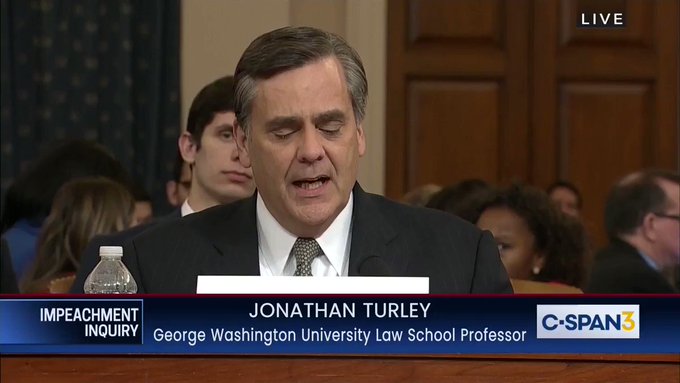
George Washington University Law School professor Jonathan Turley testifies during a hearing before the House Judiciary Committee on the constitutional grounds for the impeachment of President Donald Trump, on Capitol Hill in Washington, Wednesday, Dec. 4, 2019. (AP Photo/Alex Brandon)
When I watched the impeachment hearings today, I couldn't help but think of Inigo Montoya from The Princess Bride. When George Washington University law professor Jonathan Turley explained to Democrats why President Donald Trump did not commit bribery in his phone call with the president of Ukraine, I kept thinking of an impeachment-style version of this quote: "Bribery. You keep using that word. I do not think it means what you think it means."
Turley noted that many Democrats have called Trump's July 25 call with Ukraine President Volodymyr Zelenksy "a clear case of bribery." To that, the law professor simply insisted, "It's not."
Rep. Adam Schiff (D-Calif.) suggested that the call might fit the Founders' definition of bribery, but Turley explained why that is not the case, either. "Bribery was not this overarching concept," he noted. When discussing bribery, the lesser-known founding father Gouverneur Morris referred to the bribe French King Louis XIV gave to British King Charles II — a huge amount of money, among other things, in exchange for the Secret Treaty of Dover, in which Charles declared himself Roman Catholic.
As for the modern definition of bribery, Turley referenced the Supreme Court case McDonnell v. United States (2016), the Court vacated the bribery convictions of former Gov. Bob McDonnell (R-Va.). The bribery statute makes it a crime for a public official to "receive or accept anything of value" in exchange for being "influenced in the performance of any official act." In McDonnell, the Court ruled (8-0) that merely setting up a meeting or talking to another official or organizing an event does not fit the definition of an "official act."
In that case, Turley explained, "gifts were actually received, benefits were actually extended. There was completion. This was not some hypothetical." Yet "the Supreme Court unanimously overturned that conviction."
"It's a dangerous thing to take a crime like bribery and apply a boundless interpretation," the law professor warned. "These crimes have meaning."
"You can’t accuse a president of bribery and then, when some of us note that the Supreme Court has rejected your type of boundless interpretation, say, 'Well it’s just impeachment. We really don’t have to prove the elements.' That’s a favored mantra," he explained.
"This isn’t improvisational jazz. Close enough is not good enough," Turley quipped. "If you’re going to accuse a president of bribery, you need to make it stick — because you’re trying to remove a duly-elected president of the United States."
"It’s unfair to accuse someone of a crime and when others say well those interpretations you’re using to define the crime are not valid, to say, 'They don’t have to be valid because this is impeachment.'"
Jonathan Turley: Impeachment Claims Against Trump Also Condemn Obama's Fast and Furious Stonewalling
"That has not been the standard historically," the law professor argued. He noted that in each of the previous impeachments in U.S. history, the president had committed a crime, and even the president's party admitted it.
"Those were not just proven crimes, they were accepted crimes. Even the Democrats on that Judiciary Committee agreed that Bill Clinton had committed perjury," Turley noted. "In the case of Nixon, the crimes were established. No one seriously disagreed with those crimes."
Even in the case of President Andrew Johnson, who was impeached for violating a law that was later considered unconstitutional, everyone agreed that he had committed a crime.
"Johnson’s the outlier because Johnson was a trap-door crime," Turley admitted. "They basically created a crime knowing that Johnson wanted to replace Secretary of War Stanton. There’s no question he committed the crime, it’s just the underlying statute was unconstitutional."
Democrats often argue that impeachment is a political process, so they don't have to prove a crime in the same way a judge or jury would. By this logic, they could impeach Donald Trump for sneezing, if they wanted to. However, the Founders explicitly warned that impeachment should not become a partisan political weapon. Jenna Ellis, senior legal advisor to the Trump campaign, explained that the Article I power of impeachment must also comport with the Article II scope of impeachment — limited to "high crimes and misdemeanors."
Ellis suggested that Democrats pushing impeachment should be expelled from Congress for weaponizing a constitutional process in order to win an election.
"This is a political stunt that the Democrats know that they cannot win in 2020. They are manipulating a power in the Constitution, weaponizing the system in order to win 2020," Ellis told PJ Media. "There’s no legitimate basis to pursue this impeachment. This is just a continuing effort to oust the sitting president because they hate him."
Democrats "have been trying to oust President Trump since before he ever got inaugurated. Instead of waiting for the election that is in twelve months they are weaponizing a power that was not intended for this purpose. Their entire pattern of conduct of trying to oust President Trump is very plain evidence on its face."
Rather than letting the American people decide Trump's fate next November, Democrats are attempting to impeach him for bribery — even though his call with Zelensky does not fit the definition of bribery.
As Inigo Montoya would say, "You keep using that word. I do not think it means what you think it means."
Follow Tyler O'Neil, the author of this article, on Twitter at @Tyler2ONeil.


